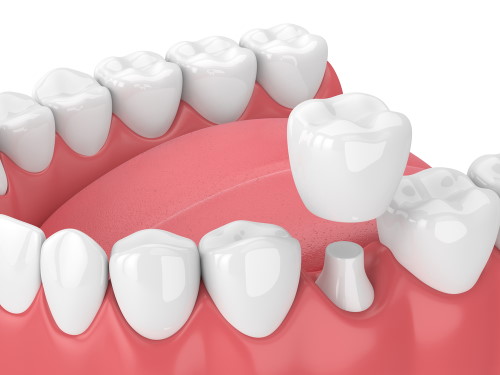Dental crowns are a typical form of dental repair operation that the majority of people will face over their lifetime. A crown may be necessary for the following reasons:
- Protect the weak tooth or hold the parts of the cracked tooth together.
- Cover the mouth with a large filling particularly when there are not many teeth remaining.
- Rehabilitate broken or severely damaged teeth.
- Secure the dental bridge in place.
- Cover the tooth that has undergone endodontic therapy.
- Cover the dental implant.
Contents: How much? | Worth it? | Insurance coverage | Appointment | FAQ
Oral surgeons conduct this kind of procedure under local, IV, or general anesthetic. It is a straightforward treatment that requires only two consultations. However, if the tooth has been broken off, damaged, or is below the surface, the surgical procedure will be prolonged.
 How much is a crown?
How much is a crown?
Dental crowns cost around $500 to $3,000 each tooth, based on the kind of materials used. Porcelain crowns commonly range in price from $800 - $3,000 each tooth. Porcelain fused to metal crowns range in price from $800 and $1,400 for each tooth. Price range for metal crowns (gold alloys and combinations) is between $800 to $2,500.
These are often cheap because dental insurance covers crowns.
The cost is decided by the following:
- Location
- Anesthetic if required
- Complexity – is it impacted or broken off below the surface? Do you need a crown lengthening procedure first?
Other costs may include:
- Diagnostic costs:
- Exam – This is usually done first to know if crowns are the best treatment for you.
- Digital Xray – This will be needed to determine the location of tooth decay. The cost is typically from $60 - 150
- Treatment options – This includes the cost for local anesthesia, dental cement, and other fees such as replacement crowns, or anything that may arise from an emergency or after-hours appointments.
- Aftercare – This would include a prescription, if necessary, and perhaps gauze or ice packs
How much is a porcelain crown?
Porcelain crowns commonly range in price from $800 - $3,000 each tooth. These are often cheaper because dental insurance covers crowns.
How much does insurance pay for dental crowns?
Dental insurance typically covers around $400 of the cost of a dental crown. Dental crowns cost an average of approximately $900 with insurance and approximately $1,300 without insurance. A porcelain crown may be slightly more expensive.
Is a Porcelain Crown Worth the Investment?
Although getting this treatment is not cheap, it shouldn’t be ignored. Disregarding the early warning symptoms of damaged or rotting teeth can result in future surgery that is more costly. A sore, broken tooth will never heal by itself.
Payments – With and Without Insurance
 Ways to save money on tooth caps
Ways to save money on tooth caps
The best approach is to have a sore or damaged area treated and removed when required. Several methods of payment are available for this procedure:
-
Insurance payment Options
Dental crown cost with insurance is one of the best ways to pay for this procedure – at least a part of it. Dental crowns are normally covered because it is an essential treatment to maintain good oral health such as fixing a cracked tooth or supporting a weak tooth. However, if a dental crown is only intended to improve your smile, your insurance provider may not cover it as it is considered a cosmetic treatment. Insurance companies do not cover dental veneers, for example, as it is only meant to improve your smile, not add value to the oral health of the wearer.
Harbor Smiles is insurance-friendly and accepts PPO and HMO. We can assist you by verifying your benefits, making insurance claims on your behalf, and assisting you in maximizing your existing benefits.
-
Government Programs that might work
Medicare cannot pay for dental care procedures as it may only pay for emergency inpatient care should there be an emergency, even though it does not pay for the dental care itself. Make sure to review your coverage if you have Medicare.
-
(FSA) Flexible Spending Account
FSA or Flexible Spending Arrangement deducts a fixed amount to be taken from your salary and put into this account to be spent purely on healthcare costs. FSAs are only available through an employer offering such an option. These are easy to use with a debit card and are available at any time. FSA funds, on the other hand, do not carry over, so you may wish to spend them all before the end of the year. You may find out more about FSAs by visiting here.
-
(HSA) Health saving accounts
HSA is a government-regulated savings account that works similarly to FSA in the sense that it sets aside pretax income to cover healthcare costs not paid by your insurance provider. The difference with FSA over HSA is that funds in HSA can roll over next year and you need to have a high-deductible insurance premium. Also, HSA contributions are tax-deductible. Discover more about HSA’s.
-
Affordable Treatments with Dental schools
Check out the dental schools in your area as they may have dental services. You’ll find that if they do offer dental services, the services are offered with huge discounts. The caveat is you let a student perform your dental care, but the good news is a board-certified dentist will be nearby to supervise the student performing the dental services.
-
In-house Dental Care Payment Plans?
The majority of dentists provide monthly payment plans, so you are not required to pay it all in one go. Dentists understand that not everyone can pay for the cost of their dental services in full. We also don’t want our patients to choose to be in pain because they cannot afford their treatment. We want to help you by offering affordable options or assistance for your dental services.
Harbor Smiles welcomes all primary credit cards, such as Master Card, Visa, and American Express. Moreover, we collaborate with outside financing providers including CareCredit, GreenSkyCredit, and the Lending Club. Best of all, we provide an in-house payment plan with no interest, which enables you to receive the care you require without needing to pay for it all at once or fretting about the high expense of a crown without insurance.
Huntington Beach, Tooth Crown Cost
Harbor Smiles accepts most credit cards, including American Express, Visa, and Mastercard. Additionally, we collaborate with third-party lenders such as Lending Club and CareCredit. We also have our own in-house payment plans offering 0% interest. You are no longer required to pay your bill in full at once. CareCredit may be able to offer you a 0% interest rate on Dental Crowns. Make an appointment if you live in the vicinity of Huntington Beach and allow us to address your concerns and assist you in beginning the process of enhancing your smile.
FAQ for Dental Cap Cost
How much is a dental crown?
Crowns are priced differently, and the cost is also dependent on the type of material used. Typically, the cost of a crown at Harbor Smiles is between $500 to $3,000, with all porcelain and zirconia crowns being the most expensive. With insurance, the cost may be reduced by half or more.
Why is a dental crown so expensive?
The cost of the procedure is determined by the type of materials used, the dentist's expertise, and the technology utilized to fabricate the crown. Dental crowns are sometimes covered by insurance as this is considered a restoration treatment. See Dr. Manali Patel DDS for an examination of your dental health and an estimate of the cost of crowns.
Are dental crowns worth it?
Yes. It is well worth the effort to obtain a crown. Whether you seek to restore a weak tooth, modify a root canal, or enhance your appearance cosmetically, these procedures represent a long-term investment in your overall health and look. More about Tooth Cap
